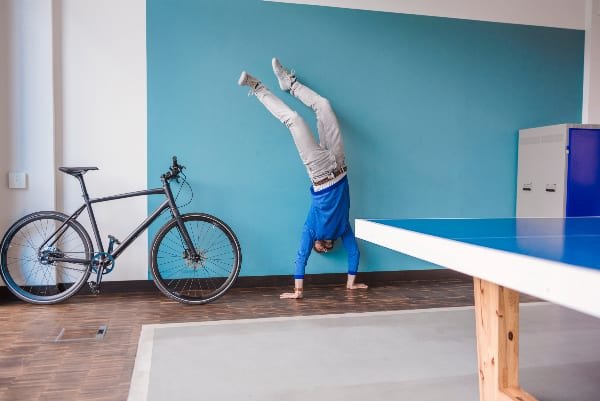Organisations must ensure they are deploying services that reduce stress and increase possibilities for productivity, so individuals can work without technological distraction.
The need to be agile and dynamic in approaches and strategies has proven to be successful in times like these, and people can do more than they think when they push outside their comfort zones. Using analytics that continuously monitor anomalies to prevent security breaches, or micro-apps to reduce administrative waste, may also enable the employee to work smarter and be more productive, boosting morale and happiness.
Allowing I.T. and other managers to combine best practice enables the organisation to capture the positive effects of letting the end users have a say in designing their jobs better, and therefore empowering them to improve their productivity and quality of work.
Human-centred tech
Historically, services have emerged from algorithm-based designs that are built by data experts, but over the last year we have seen the importance of empowering the human in this process.
When such decisions are removed from employees, they no longer feel accountable and the effect that was intended as positive becomes a negative instead, increasing stress and frustrations.
Thoughtful, human-centred technology design can also work as a predictive or preventive measurement in human sustainability, almost becoming ‘work health as a service’ by removing stress elements and increasing return-to-work rates.
Employee wellbeing
Moving forward, the digital experiences employers provide for their employees will be as important as salary. Potential talent will consider not only the values, culture and management in a role, but also the digital experience a potential employer is going to provide, and the priority that is placed on human sustainability.
When considering the digital experience, forward-thinking employers should look to integrate their wellbeing programmes: the digital experience is not just about connectivity, security and access, but should also include mental health and stress reduction.
‘Do not disturb’
It is well known that enterprise applications are often hard to use; if we compare them with the apps we use in our personal lives, the differences can be stark.
Employers need to reduce the number of complex applications available, either by only providing the workflows employees use though micro-applications and workflows or by eliminating them completely.
When adopting new software, employee wellbeing should be a consideration and decision makers should ask whether it will improve the employee experience.
We can use AI to minimise the most repetitive tasks, or simply disable other distractions when we are in meetings.
‘Do not disturb’ should be automatic and embraced. If we consider the distractions through notifications alone – corporate email, corporate chat apps, WhatsApp and the personal stuff we use for communication – it soon mounts up.
This change in mentality needs to be backed up culturally, and particularly if the corporate culture is set up for presenteeism through rapid email response rates, for example.
Wellbeing and the digital workspace
Employers should incorporate and signpost wellbeing services within their digital workspace. In fact, every digital workspace should have ‘Red Button’ access to mental health and wellbeing services.
The problem with many well-intended wellbeing programmes at work is that the information is often hard to find. Bringing it front and centre is critical, as it should be easy to locate in a time of crisis.
If the pandemic has taught us anything, it is that it is fine to admit when we are not OK. Many employers now offer programmes such as Mental Health First Aiders and counselling services provided by external third parties.
Accessing these services – alongside corporate applications and everything else we need for work – provides a better experience for employees and helps to make it ‘normal’.
The concept of the digital workspace needs to extend beyond the traditional idea of a place to access apps, to encompass everything we do at work and in our home life.
If we do not deal with the stress of work in a helpful way, over time it will become chronic – especially during a global pandemic.
As many of us have learned over the last 12 months, the dividing line between home and work is increasingly difficult to define, which makes it harder – or impossible – to switch off from work.
Human decency
Human sustainability encompasses all aspects of an organisation, and it therefore follows that everyone has a part to play.
Employers and employees can no longer perceive wellbeing programmes as a ‘perk’; they are a fundamental human right and need to be embedded into the culture of any organisation. Without people, an organisation is nothing.
We can talk about the ‘good’ a wellbeing programme does for employees and employers. In simplistic terms, it is good if employees do not suffer whether they are at home or work, so that productivity will increase – and with it profitability. It makes good business sense.
However, there is a far more pressing – and, frankly, more important – reality: the global pandemic has created an urgent need for people to be respected and wellbeing to be protected at all costs.
The best employers will be those who make wellbeing essential to the world of work, and who embed trust and honesty into the very heart of their organisations. It is not enough any more to provide wellbeing programmes as a perk: it has become a matter of human decency.
 Play Video about This Rock Might Just Save The World
Play Video about This Rock Might Just Save The World Play Video about Play 2 hours of rock
Play Video about Play 2 hours of rock Play Video about Play 2 hours of brook
Play Video about Play 2 hours of brook Play Video about Play 2 hours of sheep
Play Video about Play 2 hours of sheep















































